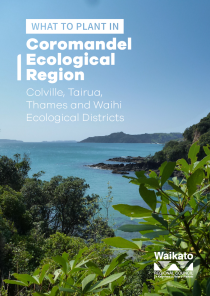What to plant in the Coromandel ecological region

The Coromandel Peninsula is a special place that draws thousands of summer visitors to enjoy its sandy beaches, dramatic landscape, extensive forests and diversity of wildlife. The Coromandel is one of the most extensively vegetated parts of the Waikato region. About 60 per cent of the peninsula is clothed in native vegetation, much of it recovering from over a century of logging, mining and farming activities.
Many agencies, community groups and individuals are working hard to protect the natural values of the Coromandel Peninsula. They are removing weeds, controlling pests, re-introducing lost wildlife and planting natives to re-create or enhance natural ecosystems. This guide will help you select and plant local native plants for your gardens and re-vegetation areas, or as specimen or shelter trees for your property.
The focus of this planting guide is on forest species. For ideas on what to plant in wetlands, check out our wetland planting guide.
This guide is for the Coromandel Peninsula, including the northern side of Waihi Beach, crossing west including the Karangahake Gorge almost to Paeroa, following the eastern bank of the Waihou River north to Thames. It includes coastal, lowland and hill country environments.
The Kauaeranga River estuary and wetland is outside these ecological districts.
Contents
Part 1
About this guide
Coromandel ecological region and districts
What is special about these ecological districts?
Special plants
Planting guide
List of nurseries for quality plants
Part 2
Special planting situations
Rennant tree stands
Stream banks and riparian zones
Stabilising slips, road cuttings and erosion-prone areas
Coromandel planting zones
Part 3
Plant list for Colville, Tairua, Thames and Waihi ecological districts





To ask for help or report a problem, contact us
Tell us how we can improve the information on this page. (optional)